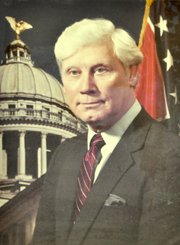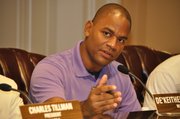Tuesday, December 31, 2013
Chokwe Lumumba Photo by Trip Burns.
For better or worse, you talked about them. A lot. Some deserved it. Others? You decide.
Chokwe Lumumba
Soon after his election, whites who had long controlled the economic and political system vowed to leave the homeland and take their wealth them. But the new president, Nelson Mandela, urged his black and white and countrymen to reconcile and move South Africa forward.
The parallel was not lost on Chokwe Lumumba, whose election to mayor of Jackson this summer touched off the same kind of xenophobic hysteria among many local whites and some middle-class blacks.
"We're going to see comparisons between us and many of the African liberation struggles and other parts of the world," including the anti-apartheid movement, Lumumba told the Jackson Free Press in June. "South Africa is one where that fight still goes on, but the election of Nelson Mandela took it to whole new level. And now it has to go to new levels still."
In the intervening months, Lumumba's tenure has likely surprised his detractors and supporters alike. A self-styled champion of oppressed people, Lumumba bit the bullet and moved ahead with a plan to implement a 1-percent sales tax increase with the controversial commission in place. He is also making moves to de-privatize government functions—meaning that city government may grow as a result.
Yet, the mass exodus of whites conservatives predicted hasn't happened, a signal they must like something Lumumba is doing. And it's not uncommon to hear white conservatives say they believe he is doing a good job.
Ultimately, it will be up to history decide Lumumba's legacy. He's not making any predictions. "I have to wait to see what similarities I have to other places because I'm not quite sure where I would see our hallmark in history compared to other places," he told the JFP.
—R.L. Nave
Bill Allain
The family of former Mississippi Gov. William "Bill" Allain, who died Dec. 2 at age 85, wants him remembered as someone who explicitly fought for Mississippians who historically haven't had many people fighting for them.
"His administration was inclusive of all people: black and white, male and female, Catholic and Protestant, rich and poor," family representatives wrote in a statement announcing his death.
Allain was born into a Catholic family on Valentine's Day in 1928, in the town of Washington, Miss. Family members say Allain, who served as governor from 1984 to 1988, remained a "strong Catholic" his entire life and that "his Catholic faith and servanthood were the driving force in his life and career."
After attending Notre Dame and earning a law degree from the University of Mississippi in 1950, Allain served three years in the Army during the Korean War as an infantryman. After being discharged, Allain practiced law in Natchez until 1962 when he was appointed an assistant state attorney general under Gov. Ross Barnett.
In 1979, Allain ran successfully for attorney general, where he first made a name for himself as an advocate for Mississippi consumers, which included blocking a plan to store nuclear waste in Mississippi—a debate that recently received new life in 2013.
—Tyler Cleveland
Dr. Hannah Gay
Everyone took a collective breath when Dr. Hannah Gay's story broke. Gay, a pediatric doctor at the University of Mississippi Medical Center (2500 N. State St., 601-984-1000), cured a toddler of AIDS, though she insisted to the Jackson Free Press that she simply followed standard treatment protocols (jfp.ms/hannahgayinterview).
The real story is that Gay diagnosed this particular toddler and began treating her and her mother. The pair stopped treatment for 18 months, and when they came back, clinicians couldn't find the virus in the girl's system. Gay may not have cured the disease as a whole (you have to have the same result on multiple patients, and it would be unlikely to get the same result in adult patients), but she cured someone.
And that's a headline maker.
—Amber Helsel
David Watkins
Perhaps nobody in Jackson can say they had the kind of whirlwind year that Jackson developer David Watkins experienced in 2013.
From developing a state-of-the-art Meridian Law Enforcement Center to testifying before a Mississippi secretary of state's office investigation into allegations for securities fraud against him, Watkins surely experienced the highest highs and the lowest lows.
The man who spearheaded the renovation of the King Edward Hotel and Standard Life Building couldn't work the same magic on Farish Street, at least not before the Jackson Redevelopment Authority took its ball, and Watkins' lease on Farish Street, and went home.
Now the project is tied up in litigation as far as the eye can see. In addition to the secretary of state's investigation, contractors have liens against Watkins, Watkins has liens against the Jackson Redevelopment Authority board, and the JRA board is counter-suing Watkins—meaning that this story will likely extend far into 2014 at least.
Still, Watkins insists he can finish the project, and with malice toward none, if JRA will drop its suit and give him back the lease. Time will tell.
—Tyler Cleveland
Cassandra Welchlin
The Jackson Free Press endorsed Cassandra Welchlin for the Senate 28 seat vacated by the death of Alice Harden, partly because of Welchlin's work as president of her West Jackson Capitol Neighbors Association and her part in organizing a vigil for James Craig Anderson, who was murdered in 2011. What she lacks in on-the-stump political experience, she makes up for with chops in the arena of policy development and sheer energy and passion for improvement of Jackson and addressing the root causes of problems such as crime and poverty.
Welchlin was unsuccessful in that bid. Unlike many failed office seekers, Welchlin has not disappeared from public view, however. She remains extremely active as the public face for the Mississippi Low Income Child Care initiative's campaign against a state program to force low-income parents to scan their fingers to pick their children up from day care. She also continues advocating for west Jackson issues such as keeping the Jackson Zoo from moving to a new part of town.
—R.L. Nave
De'Keither Stamps
After returning from a tour of duty in Iraq in the U.S. Army, De'Keither Stamps decided to start his second career as a civil servant. He ran for the Ward 4 Jackson City Council seat, which was vacated when Frank Bluntson decided to run for mayor.
Since taking his seat on the council, Stamps, 37, has maintained a perfect attendance record, save one day he had the flu, and serves in some capacity on every council committee. Not only that, but he's one of the most engaged council members on every issue, showing a willingness to question even sacred-cow issues, indicating early that his is an independent voice.
The Forest Hill High School graduate also serves on the boards of the Central Mississippi Planning and Development District and the Mississippi Municipal League.
His commitment to service isn't something he learned overnight. Stamps provided presidential security in 1996, and visited all 50 states in the process. His military service took him to Tanzania, Kenya, Switzerland, Great Britain and, eventually, Iraq, where he commanded a 17-man, 4-vehicle unit in Saddam Hussein's hometown of Tikrit.
Stamps still owns the family farm on Highway 18, and spends his time away from city council tending to the cows, bailing hay and growing vegetables.
—Tyler Cleveland
Josh Hailey
If you're a local Jacksonian with an Instagram account, chances are you've probably seen or heard of Josh Hailey's Photamerica project. The local artist/photographer drove cross-country for two years, interviewing people from all areas and walks of life on what it means to be American. He posted a multitude of photos of people and things and all the crazy and cool stuff he got to see and do.
Now, he's back and getting ready to wrap up that project. As part of his Heartalot nonprofit, he and girlfriend and artist Brittany Schall run a pop-up gallery at 3009 N. State St. On Dec. 23, he had a showcase for the Photamerica project and the opening of his Story Projectors installation. If there's one thing you can say about Hailey, it's that he never sits still. Who knows what he'll do next? Whatever it is, it'll make Jackson that much more intriguing.
—Amber Helsel
James Beard Chefs: Dan Blumenthal, Jeremy Enfinger, Jesse Houston, Mike Roemhild, Mitchell Moore, Tom Ramsey, Nick Wallace
Cooking at the James Beard House in New York City's Greenwich Village is an honor only bestowed on the top chefs around the country. This year, seven local chefs representing some of Jackson's most popular eateries experienced that thrill.
Dan Blumenthal, Jeremy Enfinger, Jesse Houston, Mike Roemhild, Mitchell Moore, Tom Ramsey and Nick Wallace planned and executed a "Friends of James Beard Scholarship Dinner" in Jackson in January 2013. It impressed the folks from the James Beard Foundation enough to earn them an invitation to New York to cook their "Southern Comfort Redux" menu in the big leagues.
"If your name appears in bold type in the journals of food and fine dining, an invitation to the Beard House is expected, but for the legions of journeyman cooks and chefs it is akin to getting called up from AA ball to pitch in the majors," Ramsey wrote in BOOM Jackson.
"It takes work and dedication and a desire to prove oneself by trial of fire in full public view."
Since then, Wallace returned to New York to participate in the James Beard Foundation's Chefs Boot Camp for Policy and Change and got the opportunity to cook a solo dinner at the James Beard House in December. He is working with the foundation to bring a conference, or "salon" to Mississippi next year, the first time the foundation will host one in the state.
—Kathleen M. Mitchell
Quardious Thomas
We know more about Quardious Thomas' death than we do his life—and we may not even know the complete story about how or why he died. The official story of homeowner Eric Williams, who shot and killed 20-year-old Thomas, was that after hearing the sound of car windows breaking, he went outside, found Thomas in his car and fired five shots when Thomas started to fumble around in the dark.
Whether Thomas was the mastermind of a car-window-breaking ring we'll never known. But that is less important than how officials handled the case. After a brief interview, Jackson police officials took Williams' word that what he said happened actually happened without an arrest or further investigation. Police also determined that Williams' actions in using deadly force to protect his Chevy Avalanche was justified under the so-called Castle Doctrine.
The other intriguing layer to this saga involves District Attorney Robert Shuler Smith.He is Thomas' cousin, but has not elected to pursue the matter himself or turn the case over to an impartial special prosecutor. That is, as far as we know—he won't return phone calls.
—R.L. Nave
Eddie Outlaw and Justin McPherson
In June 2013, the U.S. Supreme Court overturned the 1996 Defense of Marriage Act and California's Proposition 8. In September, local businessmen Eddie Outlaw and Justin McPherson finally married—in California.
Outlaw and McPherson aren't the only gay Mississippians to wed since the Supreme Court decision—likely not even the first—but they have garnered national attention. Outlaw participated in a Google Hangout with Chris Hayes of MSNBC covering the topic earlier in the year. The couple is also the subject of a new documentary by filmmaker Lauren Cioffi (see page 17) called "A Mississippi Love Story," the trailer of which has been featured on sites such as the Huffington Post (watch the trailer at jfp.ms/lovestory).
Outlaw wrote in a JFP column that the filmmakers "(hope) to capture the lives of an openly gay couple living and working in a state that likely won't change much on the issue for some time. The goal (is) to show the world that Mississippi has much good in it and abundant opportunity for change. Throughout the past four months, (Cioffi has filmed) the highs and lows of our everyday life—a life we hope will make a difference here and abroad and, hopefully, a story that might help LGBT youth understand that there is possibly a better Mississippi ahead."
The two also expanded their business this year, opening Fondren Barber Shop, which focuses on men's haircuts, shaves and skin care, next to their William Wallace Salon in Fondren.
—Kathleen M. Mitchell
subSIPPI Filmmakers: Vincent Jude Chaney, Lauren Cioffi and Greg Gandy
Three young Mississippians—Vincent Jude Chaney, Lauren Cioffi and Greg Gandy—set out in 2012 to shine a spotlight on the state they call home. The result was the "subSIPPI" project, a documentary (and hopefully, future interactive website) about the different cultures coexisting today in Missisippi.
The trio used crowdfunding website Kickstarter to raise money for the project, in addition to soliciting donations and selling merchandise. They used social media to create buzz about the project, and to get feedback and suggestions of places to visit.
Chaney told the JFP that the filmmakers wanted to capture an honest portrayal of the state. "There is this superficiality when it comes to people and their missions, usually, when filming in Mississippi—they want to show a certain demographic or certain agenda. And that's what they go for, and they can find it, and they shoot it. But with any good art or meaningful conversation, you see that there is some complexity to people," he said.
After more than a year of fundraising, traveling, filming and editing, the three 20-somethings premiered "subSIPPI" in Hattiesburg, before hosting premiere viewing parties in other cities across the state, events Chaney hoped would be "a place where people can come experience the energy that's present in the state, the undercurrent. The—what do they call it?—zeitgeist. The feeling of the time."
—Kathleen M. Mitchell
Alyce Clarke
Alyce Clarke, the first African American woman elected to the Mississippi Legislature in 1985, walks slowly and doesn't have to speak loudly. Her 28-year record speaks loudly enough, even if she doesn't always get credit for it.
Clarke, who was 44 when she first joined the Mississippi House of Representatives, has been in the thick of advocating for everything from restrooms for women lawmakers in the 1980s to authoring legislation that established drug courts in Mississippi.
The significance of the state's drug-court program is often underestimated. In 2012, Mississippi State Supreme Court Chief Justice Bill Waller Jr. credited the use of drug courts with saving the state $36 million. Drug courts are also a vital component of a task force's recent recommendations to overhaul the state's corrections system to reduce the numbers of people taking up prison beds, and costing taxpayers money, for nonviolent drug offenses.
"I definitely believe it is much better to treat people and to help them become productive citizens instead of just incarcerating them," Clarke told the Associated Press in 1998. "Not only do you help the individuals and the family, you help the community as a whole."
—R.L. Nave
Willie Jerome Manning
Mississippi has the nation's second highest incarceration rate and, in 2012, executed the second most people in the nation. Yet, hours before he was to be executed for the 1992 murders of two Mississippi State University students this May, Manning got a reprieve from the state Supreme Court.
In a letter to Oktibbeha County District Attorney Forrest Allgood who prosecuted Manning, U.S. Justice Department admitted that their expert's testimony during the trial contained "erroneous statements regarding microscopic hair comparison analysis was used" and offered to test the DNA material. Manning has always said he did not commit the crime; in fact, he says he was at a club on the night of the murders. For years, he's been trying to convince the state to test DNA from the crime scene. As of press time, the DNA testing in Manning's case had not been completed.
Manning was also convicted in 1996 for killing two women in Starkville, and sentenced to death for those murders.
—R.L. Nave
Wayne Brent
Jackson State University basketball is at its best when its recruiting local kids, and if March's big news is any indication of things to come, there are good times ahead for the Tiger faithful.
New coach Wayne Brent picked up his first big commitment from highly touted forward Treshawn Bolden. A former player of Brent's before he left Callaway High School to take the JSU gig, Bolden reportedly held offers from Auburn, DePaul, Marquette, Ole Miss, Mississippi State, Oklahoma, Southern Miss and Virginia Commonwealth.
Jackson Public Schools annually produce an abundance of quality college players, but usually those upper-tier players select the other schools off that list. Bolden's commitment is a coup for Brent, but if he has it his way, Bolden will be the first of many JPS products to give Jackson State a second look.
The 45-year-old coach finished his sixth season at Callaway last spring, where he won four of the last five state championships. He won the first of his five total state titles in 1998 at his alma mater, Provine. At JSU, he replaced veteran coach Tevester Anderson, who had held the position for 10 years and compiled a record of 250-222 before announcing his retirement in March.
—Tyler Cleveland













